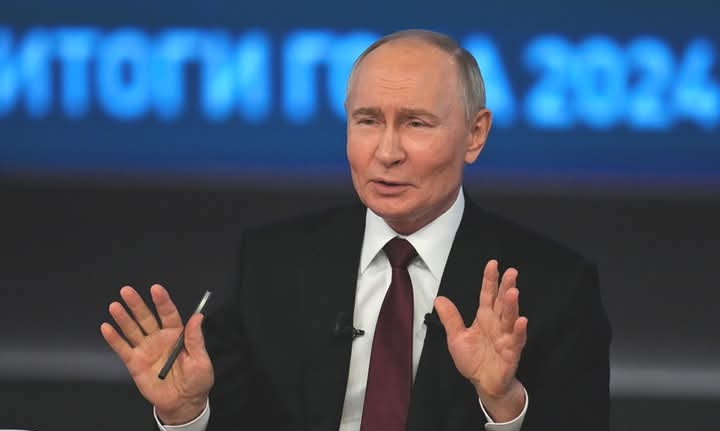By Adeyemi Adekunle
Russian President Vladimir Putin has dismissed claims that the removal of Syrian President Bashar al-Assad signals a defeat for Russia, asserting that Moscow successfully achieved its goals in the war-torn country.
Speaking at his annual news conference on Thursday, Putin emphasized Russia’s role in supporting Assad’s government since 2015 when Russian forces intervened militarily in Syria’s civil war.
The intervention, which included airstrikes and strategic military support, was widely regarded as pivotal in helping Assad retain control over key territories against opposition forces.
However, earlier this month, a sudden and unexpected surge by rebel forces led to the collapse of Assad’s government, forcing the embattled leader to flee to Russia. The developments marked a significant shift in Syria’s prolonged conflict, raising questions about Moscow’s influence in the region.
Despite Assad’s ouster, Putin rejected the notion of Russian failure. “We have achieved our goals in Syria,” he said, referencing Russia’s successful military operations that solidified its position as a key power broker in the Middle East. “Our mission was to combat terrorism and stabilize the situation, and we accomplished that.”
Russia’s Influence and Next Steps
Since its involvement, Russia has maintained a network of military bases in Syria, including the Hmeimim Air Base in Latakia and the Tartus naval facility. These installations have been crucial in projecting Russian military power across the region.
When pressed about Assad’s current status, Putin confirmed that he had not yet met with the Syrian leader since his arrival in Russia but planned to do so soon.
Among the topics to be discussed during their meeting, Putin highlighted the unresolved case of American journalist Austin Tice, who went missing in Syria in 2012 while reporting on the conflict. Putin hinted at the possibility of engaging with the rebel factions now in control of Syria to obtain information about Tice’s whereabouts.
“We are ready to ask those who currently hold power in Syria about this case,” he said, underscoring Russia’s potential role in future diplomatic negotiations surrounding Syria’s post-Assad reality.
Fallout of Assad’s Ouster
The fall of Assad’s regime represents a major turning point in the 13-year-long Syrian conflict.
For years, Assad’s rule relied heavily on Russian military backing, with Moscow using the intervention to solidify its presence in the Middle East and challenge Western influence.
Assad’s abrupt ouster, however, signals renewed uncertainty over Syria’s political future and raises concerns over the strength of Russia’s regional alliances.
The U.S. and its allies have long criticized Russia’s involvement in Syria, accusing Moscow of exacerbating humanitarian crises through relentless airstrikes and supporting a government accused of war crimes. Putin, however, maintained that Russia’s presence was necessary to counter terrorism and secure stability in Syria.
Future Engagement in Syria
Putin’s acknowledgment of ongoing engagement with Syria’s new power holders reflects Russia’s intent to preserve its influence in the region despite recent setbacks. Analysts suggest that Moscow may recalibrate its strategy to adapt to Syria’s shifting dynamics, using its established military and diplomatic leverage to remain a key player in the conflict’s resolution.
As the international community watches Syria’s transformation, Putin’s firm stance underlines Russia’s resolve to maintain its role in shaping the country’s future, even in the wake of Assad’s dramatic downfall.




